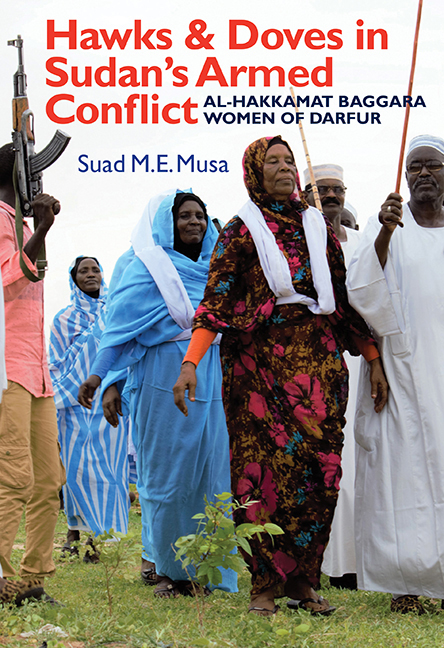Book contents
- Frontmatter
- Dedication
- Contents
- List of Illustrations
- Acknowledgements
- Glossary
- Abbreviations
- Note on Transliteration
- Introduction: Conflict in Darfur and the Role of Rural Darfuri Women
- 1 Ethnicity and Administration in Darfur
- 2 Conflict in Darfur: Causes and Implications
- 3 Al-Hakkamat Women
- 4 Local Inter-ethnic Conflicts
- 5 Government and Racial Assimilation of Ethnic Groups
- 6 Liaising with Government
- 7 New Duties and Obligations
- 8 Roles in Peace and Reconciliation
- 9 Urban Identity and Social Change
- 10 Conclusion
- Appendix: Darfur Chronology, 1445–2017
- Bibliography
- Index
- Eastern African Studies
9 - Urban Identity and Social Change
Published online by Cambridge University Press: 12 October 2019
- Frontmatter
- Dedication
- Contents
- List of Illustrations
- Acknowledgements
- Glossary
- Abbreviations
- Note on Transliteration
- Introduction: Conflict in Darfur and the Role of Rural Darfuri Women
- 1 Ethnicity and Administration in Darfur
- 2 Conflict in Darfur: Causes and Implications
- 3 Al-Hakkamat Women
- 4 Local Inter-ethnic Conflicts
- 5 Government and Racial Assimilation of Ethnic Groups
- 6 Liaising with Government
- 7 New Duties and Obligations
- 8 Roles in Peace and Reconciliation
- 9 Urban Identity and Social Change
- 10 Conclusion
- Appendix: Darfur Chronology, 1445–2017
- Bibliography
- Index
- Eastern African Studies
Summary
The previous discussion pointed to al-Hakkamat's ability to exercise agency and influence in all the settings in which they are involved. Their emigration from the village to settle in Nyala town suggests that they have become associated with different social and political settings, where they have encountered fortuitous or planned events that have functioned as turning points in the journey of their development. This new context has necessitated readjustment and the development of their personal identity to meet the challenges encountered. Some of the critical incidents and the way they have impacted on al-Hakkamat are explored here.
IDENTITY AND CHANGE
Identity, community, territory and culture are not natural, static and/or taken-for-granted orders, but are discursively and historically constructed through certain modes of power relations and resistance of the subjects to change or form their identity (Gupta and Ferguson, 1997, p. 18). Resistance in this respect is a form of power that ‘categorises the individual, marks him by his own individuality, attaches him to his own identity … a form of power which makes individuals subjects’. Identities are thus dynamic processes that are changing throughout the course of personal development when people remodel characters and reposition their identities to suit changing and challenging circumstances.
In the town of Nyala, al-Hakkamat encountered multifaceted forces that challenged their rurally acquired skills. These mainly comprised government influence and urbanisation processes. In adapting to these challenges, we must bear in mind that institutions and interest groups usually seek to forge solidarity and political alliances with (utility) groups across new sections and territorial boundaries in order to fulfil their own objectives. Sometimes these processes involve methods that restrict the range of choices available to individuals, who will be required to command respect and obedience to the rules and/or to act in what may look as against the norms. The NCP/NIF government of Sudan has designed processes and measures to mould the identities of the followers and to ensure a firm control over them so that they serve the regime's doctrine and interests. Al-Hakkamat are a living testimony of a utility group upon which the NCP exercised co-opting procedures that enabled the full manipulation of their identity and agency and directed them to serve the vested interests of the ruling elite.
- Type
- Chapter
- Information
- Hawks and Doves in Sudan's Armed ConflictAl-Hakkamat Baggara Women of Darfur, pp. 167 - 181Publisher: Boydell & BrewerPrint publication year: 2018



